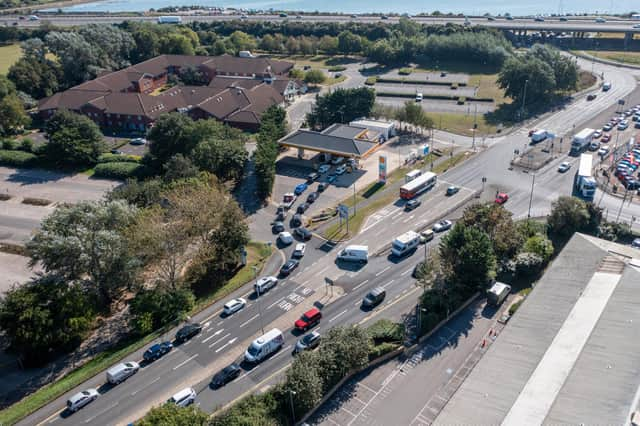Petrol panic buying puts us all on the highway to hell | Emma Kay


Chaotic queues and a serenade of angry horns.
Is this this Britain we bargained for?
Fury on the forecourts is fuelling our fuel crisis. It brings a whole new meaning to the term ‘petrol head’ as people panic buy petrol, fuelled by a burning dread of running out.
This decade is biting us all in our materialistic bottoms rather persistently and consistently.
Advertisement
Hide AdAdvertisement
Hide AdWho will be last to line up? Who will miss out? Fear of missing out (FOMO) is a very real thing that drives us dotty. Having access to instant news of shortages all over sets a pure panic within us to join the line of the fraught and fearful. We stoke the fires and fuel our own crisis.
It is very simple to say just ignore it, don’t join the crowd. If everyone else jumped off a cliff would you?
It is the toilet paper torment all over again! Remember when swarms of people were crushing and mushing into shops to get a sighting of the paper roll worth more than gold? It is the same energy and the same fear that you might have to do without.
But here is the nitty-gritty. Not being able to buy petrol is a scarier gambit than missing out on the chance to wipe and sneeze. Being able to travel to work can mean the difference between head above the water and fast poverty. Fuel fuels our existence, our livelihood and our availability to live. With the job market looking dour these days people cannot afford to be stranded trying to get to work.
Advertisement
Hide AdAdvertisement
Hide AdIt is all very well for the nicely-loaded at Number 10 to tell us not to panic over limited resources when they have never had anything limited in their life – aside from showing empathy to Joe Public during instances like this, of course.
Their finances are never on a wobbly stick. Their money is secure. Making casual remarks like this when people are struggling is beyond the pale. People are already worrying about their money security.
The decision to raise the energy price cap to its highest ever level will push half a million people into fuel poverty next month while an additional 800,000 people will be pushed into poverty from the £20 a week cut to Universal Credit, and the National Insurance pay hike will hit lowest paid workers like a truck.
Rather than our government relentlessly attacking the working class for freaking out over fuel shortages maybe consider the real worry and spiking fears over the ever-worsening winter crisis. Focus on protecting people, not making fun of them.
Leggings
Advertisement
Hide AdAdvertisement
Hide AdLockdown has made so many of us a little less clothes-minded and more comfort orientated.
Take leggings for example: superbly simple, they offer comfort and cover where needed at work or home. They are all encompassing and go with so many outfit selections.
The migration to working from home during Covid restrictions led to a massive surge in the demand and desire for casual clothing.
Smart attire is not appealing when you can rock it up on a casual cruise of comfort. Loungewear is what people are clamouring for.
Advertisement
Hide AdAdvertisement
Hide AdFashion designers such as Saville Row tailors have moved to creating gym wear and loungewear lines in order to keep up with demand and generate sales.
And who can blame them? Working in comfort is all anyone wants at the end of the day.
The fashion industry need not fall apart at the seams. They just have to make adjustments accordingly.
Google Graves
Genealogy has become a popular pastime with many wanting to dive into their own history and learn about their past.
Advertisement
Hide AdAdvertisement
Hide AdTracing ancestors has become a commonplace and popular hobby that sees a generation of history hunters capturing the past at record speed.
With the aid of a futuristic looking backpack, surveyors are walking around mapping every church. They have quite the task ahead of them having to map nearly 19,000 graveyards.
This new ambitious project, known as ‘Google Maps for Graves’ will rechristen churches as ancestor banks and help to usher in a new digital ancestry age.
Their aim is to meticulously map every crumbling headstone, every unreadable memorial and every tumbling tomb so anyone no matter where they reside will be able to search and find ancestors for that firm family connection they have been craving.
Our digital mastery has finally gotten the plot.
Comment Guidelines
National World encourages reader discussion on our stories. User feedback, insights and back-and-forth exchanges add a rich layer of context to reporting. Please review our Community Guidelines before commenting.